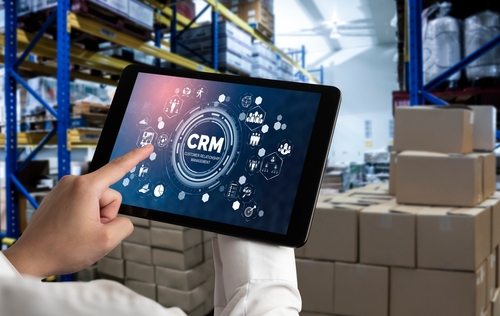Boost Efficiency and Growth with CRM for Manufacturing

Customer Relationship Management (CRM) systems have expanded beyond just service-oriented industries. In the current competitive manufacturing environment, CRM solutions have become essential for optimizing operations, improving customer satisfaction, and fostering business growth.
This article explores the specific role of CRM for manufacturing industry, highlighting its key features, advantages, and practical applications, while providing insights into why manufacturers should adopt this transformative technology.
What is the Importance of CRM in Manufacturing?
Management software for manufacturing is more than just managing customer relationships; it acts as a vital link between different operational areas such as sales, production, supply chain, and after-sales service. Manufacturers face complex processes that include large orders, extended sales cycles, and detailed supply chains.
A CRM system helps by centralizing data and automating workflows, which promotes smooth coordination across these sectors. Unlike traditional CRMs that cater to retail or service industries, manufacturing CRMs are specifically designed to address unique challenges, such as monitoring distributor relationships, managing production schedules based on demand forecasts, and integrating with Enterprise Resource Planning (ERP) systems.
Features of Manufacturing CRMs
Manufacturing CRMs come equipped with specialized features to address the industry’s unique needs:
- Sales Pipeline Management
Manufacturing CRMs manage long sales cycles by tracking leads through each stage of the pipeline. They provide real-time insights into deal progress and automate follow-ups to improve conversion rates. - Demand Forecasting
Using historical sales data and market trends, CRMs predict future demand to optimize production schedules and inventory management. - Order Tracking
These systems enable manufacturers to monitor orders from placement to delivery, ensuring transparency for both internal teams and customers. - Integration with ERP Systems
Seamless integration with ERP platforms allows manufacturers to synchronize customer data with supply chain and production processes for better decision-making. - After-Sales Support
CRMs streamline post-sale services such as maintenance scheduling, warranty management, and customer support ticketing. - Custom Reporting and Analytics
Advanced analytics tools provide actionable insights into sales performance, customer behavior, and operational efficiency. - Mobile Access
Many modern CRMs offer mobile-friendly interfaces that empower field sales teams to access critical information on the go.
Benefits of CRM in Manufacturing
1. Enhanced Customer Focus
Manufacturers can use CRM systems to build deeper relationships with customers by personalizing interactions based on historical data. This helps retain clients and drives repeat business.
2. Streamlined Operations
CRMs automate repetitive tasks like order processing and follow-ups, reducing errors while saving time. This operational efficiency translates into faster delivery times and improved productivity.
3. Improved Forecasting
Accurate demand forecasting prevents overproduction or stockouts by aligning production schedules with market needs.
4. Better Collaboration Across Departments
A centralized CRM ensures that all departments—sales, production, logistics—work from the same data set, fostering collaboration and reducing miscommunication.
5. Scalability
As businesses grow, manufacturing CRMs scale effortlessly to accommodate increased data volumes and more complex workflows.
What Are the Real-World Applications of CRM in Manufacturing?
Case Study 1: TENMAT’s Revenue Growth
TENMAT, a UK-based manufacturer of advanced materials, faced challenges in scaling its North American operations while maintaining customer relationships across long sales cycles. By implementing a tailored CRM solution, they achieved a 20% increase in revenue and a 30% boost in sales efficiency without expanding their workforce.
Case Study 2: Wireless Manufacturer’s Efficiency Boost
An Ontario-based wireless mesh manufacturer implemented Microsoft Dynamics CRM to streamline customer service and manage interactions with contract manufacturers. The result was enhanced case tracking capabilities and improved supply chain coordination.
Case Study 3: Zendesk’s Impact on Customer Service
A global manufacturing firm used Zendesk CRM to transform its customer service culture. The platform enabled real-time data tracking and reporting, improving satisfaction rates by addressing client concerns more effectively.
What Are the Steps for Implementing CRM in Manufacturing?
- Define Objectives
Identify specific challenges you aim to address with the CRM system—be it improving lead management or enhancing after-sales support. - Choose the Right Platform
Evaluate CRM solutions based on features like ERP integration capabilities, ease of use, scalability, and cost-effectiveness. - Data Migration
Ensure seamless transfer of existing customer data into the new system while maintaining accuracy. - Employee Training
Train your workforce on using the CRM effectively to maximize its potential benefits. - Continuous Monitoring
Regularly assess the system’s performance against predefined KPIs to ensure it meets your business goals.
What Are the Challenges in Adopting CRM for Manufacturing?
While the advantages are clear, CRM adoption in manufacturing is not without challenges:
- Resistance to Change: Employees accustomed to traditional methods may resist adopting new technology.
- Integration Complexities: Synchronizing a CRM with existing ERP systems can be technically demanding.
- Cost Concerns: High initial investment may deter smaller manufacturers from implementing robust solutions.
- Data Security Risks: Centralizing sensitive customer information necessitates stringent cybersecurity measures.
Addressing these challenges requires careful planning and choosing a vendor that offers reliable support throughout implementation.
What Are the Future Trends in Manufacturing CRMs?
As technology evolves, CRM for manufacturing businesses is becoming smarter and more adaptive:
- AI-Powered Insights
Artificial intelligence is enhancing predictive analytics capabilities within CRMs for better demand forecasting and customer behavior analysis. - IoT Integration
Internet of Things (IoT) devices are being integrated into CRMs to provide real-time updates on equipment performance or product usage patterns. - Cloud-Based Solutions
Cloud-based CRMs offer flexibility and scalability while reducing infrastructure costs for manufacturers. - Enhanced Mobile Functionality
Mobile-first designs are enabling field teams to access real-time data anytime, anywhere. - Focus on Sustainability
CRMs are being used to track environmental impact metrics as manufacturers strive for greener operations.
FAQs About CRM for Manufacturing Industry
1. What is a manufacturing-specific CRM?
A manufacturing-specific CRM is tailored to address industry needs like long sales cycles, distributor management, demand forecasting, and integration with ERP systems for seamless operations.
2. How does a CRM improve production efficiency?
CRMs ensure that production aligns closely with market needs while minimizing delays or errors by providing accurate demand forecasts and streamlining communication between departments.
3. Can small manufacturers benefit from using a CRM?
Yes! Scalable solutions allow small manufacturers to enhance customer management processes without overwhelming their resources or budgets.
4. What should I look for when choosing a manufacturing CRM?
Key features include ERP integration capabilities, robust reporting tools, mobile access options, scalability potential, and user-friendly interfaces.
5. How long does it take to implement a manufacturing CRM?
Implementation timelines vary but typically range from several weeks to months depending on system complexity and organizational readiness.
Conclusion
CRM systems are essential for manufacturers who want to remain competitive in today’s complex market. These tools enhance operational efficiency and strengthen client relationships by centralizing customer information and automating processes across various departments such as sales, production, logistics, and after-sales service.
Whether you’re a small manufacturer or a large industry player aiming to scale your operations effectively, investing in a specialized manufacturing CRM is crucial for sustainable growth in the ever-changing business environment.
Article by Solutions Metrix



